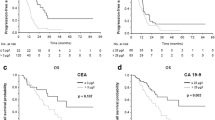Abstract
In patients with metastatic colorectal cancer (mCRC), radiological imaging represents the current standard to evaluate the efficacy of chemotherapy. However, with growing knowledge about tumor biology, other diagnostic tools become of interest which can supplement radiology. The aim of the present study was to examine the correlation of tumor and serum markers with radiological imaging in patients with mCRC receiving first-line therapy. Patients were included if tumor (carcinoembryonic antigen (CEA), carbohydrate antigen 19-9 (CA 19-9)) and serum marker (lactatdehydrogenase (LDH), γ-glutamyltransferase (γGT), alkaline phosphatase (AP), C-reactive protein (CRP), leucocyte count (WBC), hemoglobin (Hb)) levels were available at baseline and at least two times during treatment. The decline and increase of tumor and serum markers over time were approximated for each patient by estimating slopes depending on the radiological assessment. A linear mixed effects multiple regression model for each subject was used to evaluate the intra-class correlation of these slopes modeling tumor and serum marker changes with radiological imaging. Data of 124 patients (41 female, 83 male; median age 62.9 years, range 27–85) who received first-line chemotherapy for mCRC from 11/2007 to 04/2010 were analyzed retrospectively. CEA level slopes (n = 49; slopes = 102) differed between radiologically determined progressive disease (PD) and partial response (PR) (p = 0.005) and between PD and stable disease (SD) (p = 0.042). CA 19-9 level slopes (n = 57; slopes = 127) also showed a significant difference between PD and PR (p = 0.002) and PD and SD (p = 0.058). Furthermore, CRP slopes (n = 62; slopes = 134) differed significantly between PD and PR (p = 0.009). For LDH, ALP, γGT, Hb, and WBC, no correlations were observed. The results indicate the correlation of the tumor markers CEA, CA 19-9, and the serum marker CRP with radiological imaging in patients with mCRC receiving first-line chemotherapy. Further data analyses would be helpful to develop a predictive model for tumor response based on an early tumor marker increase or decrease.


Similar content being viewed by others
References
Gehan EA, Schneiderman MA. Historical and methodological developments in clinical trials at the National Cancer Institute. Stat Med. 1990;9:871–80. discussion 903–876.
Miller AB, Hoogstraten B, Staquet M, Winkler A. Reporting results of cancer treatment. Cancer. 1981;47:207–14.
Therasse P, Arbuck SG, Eisenhauer EA, Wanders J, Kaplan RS, Rubinstein L, et al. New guidelines to evaluate the response to treatment in solid tumors. European Organization for Research and Treatment of Cancer, National Cancer Institute of the United States, National Cancer Institute of Canada. J Natl Cancer Inst. 2000;92:205–16.
Eisenhauer EA, Therasse P, Bogaerts J, Schwartz LH, Sargent D, Ford R, et al. New response evaluation criteria in solid tumours: revised RECIST guideline (version 1.1). Eur J Cancer. 2009;45:228–47.
Iwanicki-Caron I, Di Fiore F, Roque I, Astruc E, Stetiu M, Duclos A, et al. Usefulness of the serum carcinoembryonic antigen kinetic for chemotherapy monitoring in patients with unresectable metastasis of colorectal cancer. J Clin Oncol. 2008;26:3681–6.
Kouri M, Pyrhonen S, Kuusela P. Elevated CA19-9 as the most significant prognostic factor in advanced colorectal carcinoma. J Surg Oncol. 1992;49:78–85.
Mitsuyama Y, Shiba H, Haruki K, Fujiwara Y, Furukawa K, Iida T, et al. Carcinoembryonic antigen and carbohydrate antigen 19–9 are prognostic predictors of colorectal cancer with unresectable liver metastasis. Oncol Lett. 2012;3:767–71.
Locker GY, Hamilton S, Harris J, Jessup JM, Kemeny N, Macdonald JS, et al. ASCO 2006 update of recommendations for the use of tumor markers in gastrointestinal cancer. J Clin Oncol. 2006;24:5313–27.
Chibaudel B, Bonnetain F, Tournigand C, Bengrine-Lefevre L, Teixeira L, Artru P, et al. Simplified prognostic model in patients with oxaliplatin-based or irinotecan-based first-line chemotherapy for metastatic colorectal cancer: a GERCOR study. Oncologist. 2011;16:1228–38.
Giessen C, Stintzing S, Laubender RP, Ankerst DP, Schulz C, Moosmann N, et al. Analysis for prognostic factors of 60-day mortality: evaluation of an irinotecan-based phase III trial performed in the first-line treatment of metastatic colorectal cancer. Clin Colorectal Cancer. 2011;10:317–24.
Mazhar D, Ngan S. C-reactive protein and colorectal cancer. QJM. 2006;99:555–9.
Stillwell AP, Ho YH, Veitch C. Systematic review of prognostic factors related to overall survival in patients with stage IV colorectal cancer and unresectable metastases. World J Surg. 2011;35:684–92.
Conflicts of interest
Within this study the authors have no conflicts of interest to report and no financial disclosures to make. This work is part of Johannes Koch’s doctoral thesis. M. Michl received payment support for congressional travel from SIRTeX Medical, outside the submitted work; V. Heinemann reports research grant, travel support, advisory boards, and honoraria for lectures from Merck Serono, Roche, and Amgen. D.P. Modest received research grant, advisory boards travel support, and honoraria for lectures from Merck Serono, Roche, and Amgen. C. Giessen received travel support from Roche. J. Koch, R. P. Laubender, and Ch. Schulz have nothing to disclose.
Author information
Authors and Affiliations
Corresponding author
Rights and permissions
About this article
Cite this article
Michl, M., Koch, J., Laubender, R.P. et al. Tumor markers CEA and CA 19-9 correlate with radiological imaging in metastatic colorectal cancer patients receiving first-line chemotherapy. Tumor Biol. 35, 10121–10127 (2014). https://doi.org/10.1007/s13277-014-2280-7
Received:
Accepted:
Published:
Issue Date:
DOI: https://doi.org/10.1007/s13277-014-2280-7




